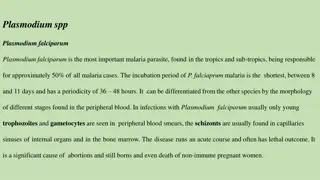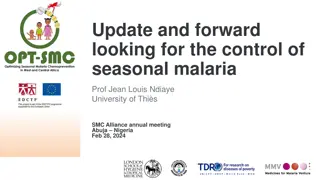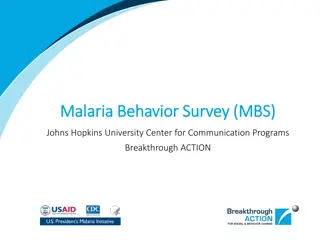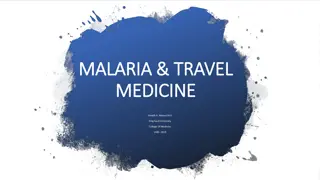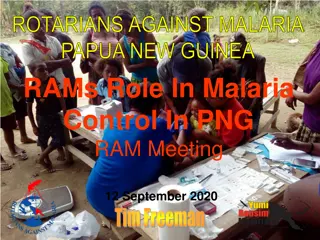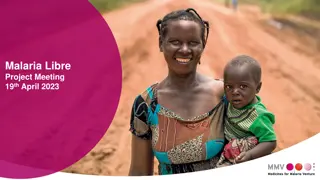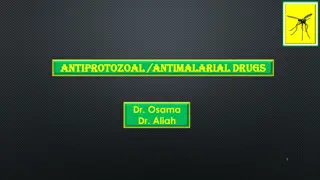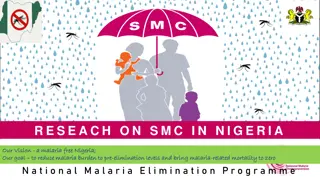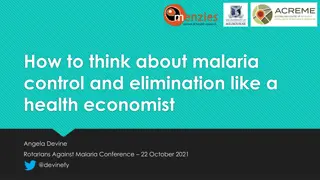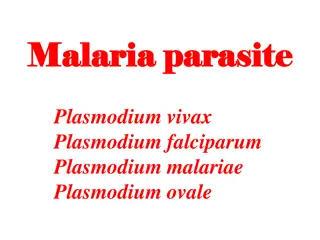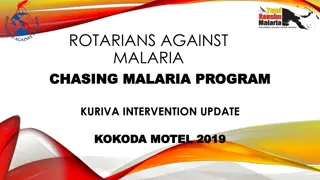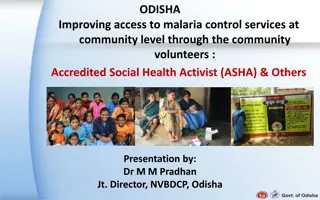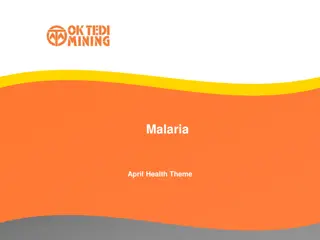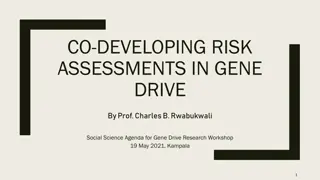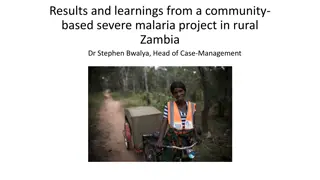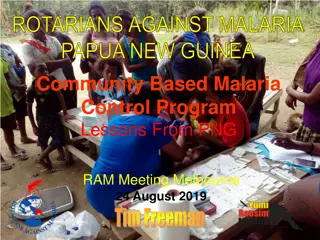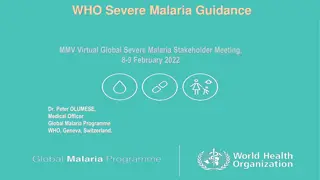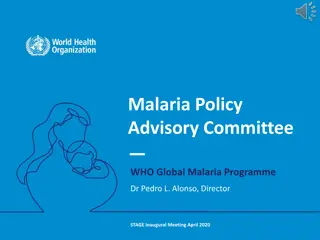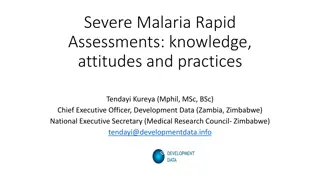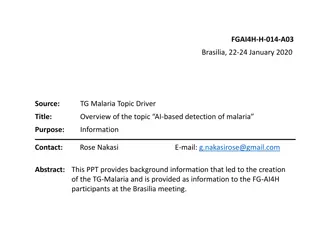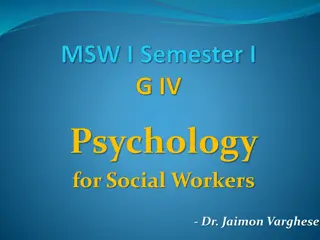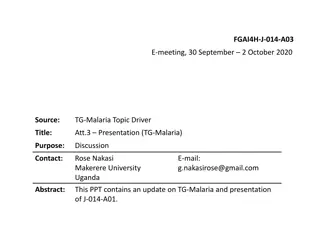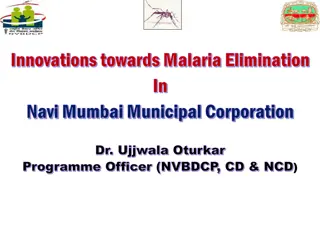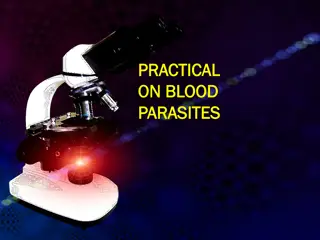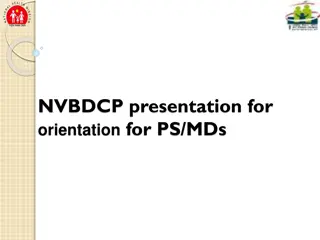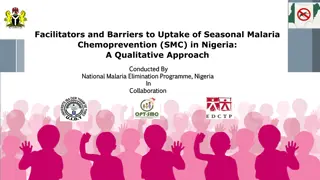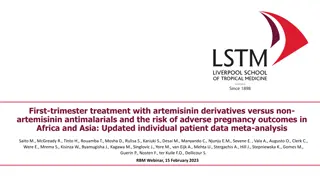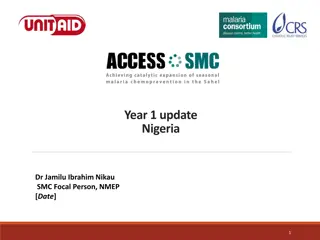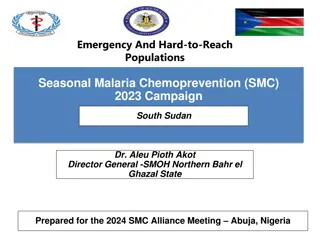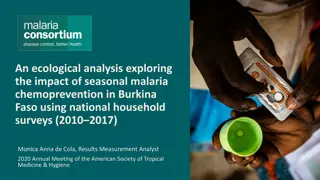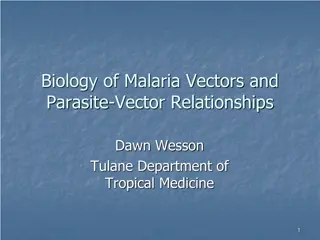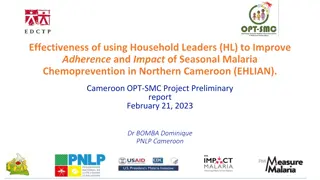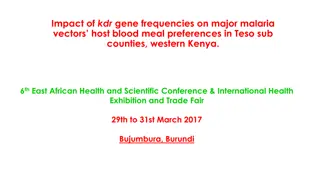Malaria Vaccines 101
Explore the complexities of malaria vaccine development, targeting Plasmodium species/stages, immunity evidence, and broad vaccine approaches focusing on sub-unit vaccines. Discover the quest for an effective and accessible malaria vaccine.
10 views • 32 slides
Optimizing MDA for Malaria Reduction in Senegal
Study on mass drug administration with dihydroartemisinin-piperaquine and primaquine in Senegal to reduce malaria transmission. Senegal's progress in malaria reduction, seasonal transmission, and comparison of SMC vs. MDA strategies. WHO recommendations and testing a hypothesis for sustainable impac
1 views • 30 slides
Malaria Libre open project meeting
The Malaria Libre Open Project Meeting scheduled for 25/01/2024 will feature updates from key project members including Dr. Diego Gonzalez Cabrera and Dr. Didier Leroy. The meeting will cover an introduction to Malaria Libre, project updates, and allow for any other business discussions. The project
0 views • 27 slides
Enhancing Malaria Services Access in South Sudan - Annual Meetings Summary
The Eastern and Southern National Malaria Programs, along with partners, conducted meetings in Uganda to address malaria service accessibility in South Sudan. The Malaria Matchbox initiative aimed to identify barriers and risk factors hindering equitable service provision, focusing on behavior, soci
0 views • 26 slides
Overview of Plasmodium falciparum and Plasmodium vivax Malaria Parasites
Plasmodium falciparum is the most significant malaria parasite, responsible for about 50% of cases, with a short incubation period and distinct morphology in blood smears. It causes severe symptoms and complications, affecting various organs. In contrast, Plasmodium vivax is the most common malaria
2 views • 7 slides
Strengthening Seasonal Malaria Control Initiatives in West Africa
Prof. Jean Louis Ndiaye leads a collaborative effort involving NMPs from various countries to optimize the effectiveness of Seasonal Malaria Chemoprevention (SMC). The project aims to enhance research priorities, conduct IR/OR projects, and promote inter-country collaboration to combat malaria in th
1 views • 13 slides
The Impact of Malaria Eradication Programs in Sub-Saharan Africa
Malaria, an infectious disease transmitted by mosquitoes, poses a significant threat in Sub-Saharan Africa where over half a billion people are affected annually. Despite various efforts including global eradication programs, the focus on prevention rather than treatment is deemed crucial to minimiz
0 views • 14 slides
Malaria Behavior for Effective SBC Interventions
Malaria Behavior Survey (MBS) by Johns Hopkins University aims to inform strategies by identifying factors related to mosquito net use, IPTp adoption, and fever treatment in children. The survey covers multiple countries and employs a robust methodology with data collected using ideation model-infor
1 views • 21 slides
Malaria & Travel: Epidemiology, Etiology, and Prevention
Exploring the epidemiology and etiology of malaria with a focus on travel-related risks. Educational objectives include gaining knowledge on malaria transmission, prevention strategies, and the importance of seeking medical advice before traveling to endemic areas.
0 views • 62 slides
Role of ROTARIANS AGAINST MALARIA (RAM) in Malaria Control in Papua New Guinea
ROTARIANS AGAINST MALARIA (RAM) plays a crucial role in malaria control in Papua New Guinea through various programs like net distribution, health facility supervision, and drug distribution. Funding from sources like the Global Fund, Against Malaria Foundation, and sustainable initiatives ensures t
0 views • 36 slides
Update on Malaria Libre Project Meeting - 19th April 2023
The Malaria Libre Project Meeting held on 19th April 2023 discussed key topics such as the Aryl Imidazole chemical series, potential new series, and the MMV Early Lead Criteria for the next milestone. Chemistry resources appointed by MMV were also outlined, focusing on Aryl Imidazoles as the main ar
0 views • 13 slides
Antimalarial Drugs and Malaria Transmission
Explore the world of antimalarial drugs and the intriguing case of a non-traveler contracting malaria in Italy. Learn about the main antimalarial drugs, WHO therapeutic strategies, and the global impact of malaria. Delve into the complexities of malaria transmission and the potential factors at play
0 views • 35 slides
Challenges in Malaria Prevention in Nigeria: A Qualitative Study
This study focuses on identifying facilitators and barriers to the uptake of Seasonal Malaria Chemoprevention (SMC) among children aged 3-59 months in selected states of Nigeria. Through key informant interviews, in-depth interviews, and focus group discussions, the research aims to analyze factors
0 views • 18 slides
Economic Perspectives on Malaria Control and Elimination
Analyzing malaria control and elimination from an economic standpoint is crucial for understanding the long-term health outcomes, cost savings, operational strategies, funding gaps, and wider economic consequences of the disease. By examining the correlation between malaria and poverty, exploring fu
4 views • 21 slides
Malaria Parasites and Their Life Cycle
Malaria parasites, including Plasmodium vivax, falciparum, malariae, and ovale, exhibit an alternation of generations phenomenon with a life cycle involving asexual and sexual phases. These parasites require both vertebrate and invertebrate hosts for development, with maturation stages involving gam
0 views • 30 slides
Chasing Malaria Programme Updates & Interventions in Papua New Guinea
The Chasing Malaria Programme, funded by Rotarians Against Malaria, focuses on mapping and addressing malaria in Central and NCD Provinces in Papua New Guinea. It involves distributing Long Lasting Insecticidal Nets (LLINs) to areas with malaria cases and collaborating with local communities to comb
1 views • 22 slides
Improving Access to Malaria Control Services in Odisha through Community Volunteers
Odisha faces a significant malaria burden, with a high proportion of cases reported in hilly and forested areas. The state's health infrastructure includes a network of medical facilities and community health centers. To combat malaria, community volunteers, including Accredited Social Health Activi
0 views • 21 slides
Malaria: Causes, Symptoms, and Prevention
Malaria is an infectious disease caused by the Plasmodium parasite, transmitted through the bite of a female Anopheles mosquito. There are four types of Plasmodium parasites, with Plasmodium falciparum being the most severe. Malaria incidence globally has seen millions of cases with significant mort
9 views • 14 slides
Co-Developing Risk Assessments in Gene Drive
Gene drive technology is a cutting-edge approach aimed at combating malaria by spreading genetically modified genes in mosquito populations. This technology has the potential to protect endangered species and conserve nature. However, successful implementation requires complex collaborations, risk a
2 views • 16 slides
Results and Learnings from a Community-Based Severe Malaria Project in Rural Zambia
Zambia's community-based severe malaria project has successfully scaled up the use of Rapid Access to Treatment (RAS) strategy, resulting in improved access to malaria case management services. Key success factors include training over 16,500 Community Health Workers (CHWs) since 2017, community mob
0 views • 9 slides
Lessons Learned from Rotarians Against Malaria Program in Papua New Guinea
Community-based malaria control program undertaken by Rotarians Against Malaria in Papua New Guinea focused on chasing malaria hotspots through various strategies like using Long Lasting Insecticidal Nets (LLINs) and mapping malaria cases. The program aims to replicate its success in other partner c
0 views • 31 slides
Severe Malaria Treatment Guidelines by WHO
Severe malaria requires prompt diagnosis and treatment to prevent death and complications. The main focus is on achieving therapeutic concentrations of effective antimalarials quickly. Management involves clinical assessment, specific antimalarial treatment, addressing complications, and supportive
0 views • 18 slides
WHO Global Malaria Programme: Malaria Policy Advisory Committee Insights
The Malaria Policy Advisory Committee (MPAC) ensures independent, strategic advice on all aspects of malaria control and elimination. MPAC convenes twice a year, with meetings open to observers, and provides valuable recommendations to the WHO Director-General through the Global Malaria Programme. V
1 views • 6 slides
Severe Malaria Rapid Assessments: Knowledge, Attitudes, and Practices
This presentation discusses severe malaria rapid assessments conducted by Development Data in Uganda and Zambia. The assessments aimed to improve severe malaria case management at community and lower health facility levels. Key findings include knowledge levels among health workers, transitioning kn
0 views • 20 slides
AI-based Detection of Malaria: Overview and Challenges
This presentation delves into the utilization of AI for malaria detection, showcasing the background that led to the creation of TG-Malaria. Highlighting the current burden of malaria in Uganda and other developing nations, it addresses challenges in microscopy diagnosis due to a lack of trained tec
0 views • 20 slides
Human Behavior: Insights for Social Workers
This material delves into the intricacies of human behavior, exploring factors influencing behavior such as heredity, environment, intelligence, needs, and motives. It covers the concept of human behavior, stages in life from conception to old age, and theories of human development by eminent psycho
2 views • 71 slides
AI-Based Malaria Detection Updates and Challenges in Endemic Regions
Malaria remains a significant global health challenge, with limited trained lab technicians and insufficient microscopy resources. Artificial Intelligence (AI) solutions show promise in improving timeliness and accuracy of malaria detection. The need for standardized benchmarking of AI models and im
0 views • 22 slides
Innovative Approaches for Malaria Elimination in Navi Mumbai Municipal Corporation
Navi Mumbai Municipal Corporation, under the leadership of Dr. Ujjwala Oturkar, Programme Officer, is implementing various innovative strategies towards malaria elimination. With a total population of over 1.5 million, the corporation has established specialized hospitals, urban health posts, and co
0 views • 21 slides
Laboratory Diagnosis of Malaria: Methods and Procedures
Methods for diagnosing malaria in laboratory settings involve techniques such as light microscopy and rapid diagnostic tests. Light microscopy is used to prepare blood films, enabling the detection of malaria parasites like Plasmodium falciparum. Rapid diagnostic tests can quickly identify malaria a
0 views • 26 slides
National Vector Borne Disease Control Program Overview
The National Vector Borne Disease Control Program (NVBDCP) focuses on preventing and controlling diseases such as Malaria, Dengue, Chikungunya, Filariasis, Japanese Encephalitis, and Kala-azar. Implemented at state level, NVBDCP aims to eliminate these diseases through strategic planning, policy mak
0 views • 9 slides
Facilitators and Barriers to Seasonal Malaria Chemoprevention Uptake in Nigeria
This qualitative study conducted by the National Malaria Elimination Programme in Nigeria aimed to identify factors influencing the uptake of Seasonal Malaria Chemoprevention (SMC) among children aged 3-59 months in selected states. The study explored caregivers' knowledge, experiences, and attitude
0 views • 12 slides
Comparison of Artemisinin-Based vs. Non-Artemisinin Treatment in First-Trimester Malaria and Pregnancy Outcomes
Updated meta-analysis compares outcomes of artemisinin-based and non-artemisinin treatment in first-trimester malaria. Artemisinin considered safe in pregnancy, with WHO updates recommending artemether-lumefantrine (AL) in the first trimester. Study aims to assess risk of adverse pregnancy outcomes
0 views • 14 slides
Nigeria Year 1 Update Summary - Malaria Prevention Program
In 2015, the Malaria Prevention Program in Nigeria achieved significant milestones under the leadership of Dr. Jamilu Ibrahim Nikau. Activities included training of health workers, distributors, and SMC cycles. Delivery methods involved door-to-door and fixed points approaches. The program covered S
0 views • 18 slides
Seasonal Malaria Chemoprevention Campaign 2023 in South Sudan
Dr. Aleu Pioth Akot led the successful Seasonal Malaria Chemoprevention (SMC) campaign in Northern Bahr el Ghazal State, South Sudan in 2023. The focus was on reducing malaria morbidity and mortality among high-risk children aged 3-59 months. Key lessons learned included implementing a door-to-door
0 views • 11 slides
Impact of Seasonal Malaria Chemoprevention in Burkina Faso
Exploring the impact of seasonal malaria chemoprevention (SMC) in Burkina Faso using national household surveys. SMC involves administering anti-malaria medication to children during peak transmission seasons to prevent malaria episodes. The study investigates the effectiveness of SMC delivery, cove
0 views • 12 slides
Malaria Vectors and Their Habitats
Explore the complex relationships between malaria vectors and parasites, highlighting the biology and life cycles of Anopheline mosquitoes. Discover the diverse species within the Culicidae family and their preferences in habitat, influenced by human activities. Gain insights into the genus Anophele
0 views • 47 slides
Effectiveness of Household Leaders in Improving Malaria Chemoprevention Adherence in Cameroon
The EHLIAN project in Cameroon aims to assess the impact of utilizing Household Leaders to enhance adherence to seasonal malaria chemoprevention in the Far North region. The study compares reminder strategies for adherence to SPAQ courses, evaluates community outcomes, and explores the feasibility o
0 views • 14 slides
Impact of Resistance on Parasite Fitness in Quinoline-based Antimalarial Drugs
Resistance cost of fitness studies the impact of drug resistance on pathogens like Plasmodium berghei. Lumefantrine and Piperaquine, used in ACT against malaria, are investigated to understand how resistance affects parasite fitness. The research aims to provide insights into combating drug resistan
0 views • 15 slides
Impact of KDR Gene Frequencies on Malaria Vectors' Blood Meal Preferences
This study delves into the impact of KDR gene frequencies on major malaria vectors' host blood meal preferences in Teso sub-counties, Western Kenya. It explores insecticide resistance and its implications for malaria transmission potential among these vectors, focusing on Anopheles gambiae sensu lat
0 views • 17 slides
Malaria Epidemiology and Prevention
Malaria, a life-threatening disease transmitted by infected mosquitoes, remains a global public health issue. The content covers the epidemiology, clinical presentation, transmission modes, risk factors, prevention, and control strategies. It highlights the significant decrease in malaria cases and
0 views • 24 slides




